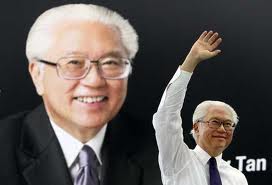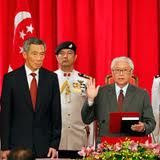September 3, 2011
http://www.theedgemalaysia.com (September 5 issue)
Singapore’s Presidential Election 2011: A Review
MNCs take great pains to study countries they invest in. Any MNC analyst conducting a study of Singapore’s political and economic fundamentals will consider the determinants of political stability…and conclude that these are strongly in favor of political stability and a policy regime that will remain rational, business friendly and open to foreign investors.–M. Bhaskaran
In recent weeks, a surprising number of foreign observers with interests in Singapore has been asking whether the city-state would adopt more populist policies that would undermine its attractiveness as a business center or raise costs. Some have even asked whether the political stability they took for granted was at risk.
A careful look at the political and economic determinants of Singapore’s political stability and policy making suggests that these concerns are quite unwarranted. Singapore is changing; it is becoming more of a normal country with normal politics and so there night be some more uncertainties than we have been used to. But the pillars of the system are robust, implying that businesses and investors, whether local or foreign, have little to fear.
Singapore’s Politics: More Competitive and Complex
That Dr. Tony Tan, the candidate favored by the establishment, secured victory with only 35.25%  of the vote and .4 percentage point ahead of his next most popular rival marks a fundamental structural change in Singapore politics.
of the vote and .4 percentage point ahead of his next most popular rival marks a fundamental structural change in Singapore politics.
Dr. Tan Cheng Bock, a former parliamentarian from the ruling Peoples Action Party (PAP), who had become an occasional critic of the government garnered 34.8% of the vote.
But that did not represent the splitting of the votes of PAP loyalists between two candidates who both agreed with the PAP world view. In stead the election showed clearly that the hardcore of support that the PAP could rely on has certainly been reduced to just about a third of the electorate–from something to half the electorate a few years ago.
More than that, the results show a Singapore electorate that is basically divided three ways:
- A hard core of about 35% who are PAP loyalists through and through;
- Another hardcore of around 30% (representing the votes garnered by Tan Jee Say and Tan Kin Lian, who were more vigorously critical of existing PAP policies) who are alienated from the PAP and want deeper changes in Singapore; and
- A middle ground of around 35% who are uncomfortable enough with some aspects of PAP rule to vote tactically against the party but who do not want political incoherence to be created by a more confrontational style of politics. These voters are probably comfortable with continued PAP rule and would consider voting for the PAP again should policies change.
In other words, the electorate is divided, but the nature of the divisions does not affect long term stability–the divisions are not along ideological or ethnic lines but on less emotive policy-oriented lines.
Long Term Political Stability enhanced
In fact, we would go further to argue that such changes not only weaken political stability, but they actually strengthen Singapore in the long run. Why?
 First, Dr. Tony Tan is now President, an institution which keeps all the key agencies of power firmly in the hands of the establishment, ensuring coherence in political governance. He is an independent-minded, highly experienced and greatly respected withing government and among Singaporeans. He will certainly fulfill the role of President with the grace and wisdom that Singaporean desire.
First, Dr. Tony Tan is now President, an institution which keeps all the key agencies of power firmly in the hands of the establishment, ensuring coherence in political governance. He is an independent-minded, highly experienced and greatly respected withing government and among Singaporeans. He will certainly fulfill the role of President with the grace and wisdom that Singaporean desire.
More fundamentally and second, political stability is a function of the strength of institutions, the capacity of the political system to adjust and adapt to changing circumstances and the political culture of the people. All three factors argue for solid political stability:
- Singapore has strong institutions. The civil service, judiciary, police force, town councils, statutory boards, universities, and so on rank among the world’s best. Institutional strength means that political stability does not depend on particular personalities and also helps to anchor the system of governance;
- Unlike failed political systems such as the Soviet Union’s, Singapore’s political system has been adjusting to accommodate the changing demands of a more complex polity. The opposition parties are now stronger, the media has loosened up, non-governmental organisations express themselves more forcefully on a range of issues such as capital punishment and protection of foreign workers, and both the ruling party and the government it runs have become more sensitive and responsive to the public; and
- What is also important is that Singapore’s political culture is set by a practical minded, unexcitable and well-educated citizenry who value stability and rational policies and are not easily swayed by populist giveaways or appeals to gut issues. The vast majority of voters will give a short shrift to any party proposing blatantly giveaway policies.
Economic Fundamentals
Some observers have wondered whether some recent policy adjustments in such areas as immigration and foreign worker restrictions mark a shift to populism, a departure from the hard-headed policy making that has stood Singapore in good stead.
We think this is far-fetched for several reasons:
- First, the government is not being “populist” when it adjusts the policies on immigration. The tightening of restrictions and levies on foreign workers started well before the general election (May 11, 2011) when the Economic Strategies Committee report found that dependence of too many foreign workers was holding back increased productivity that is critical to long term economic growth. The presidential election outcome is not going to change the studied and graduated recalibration of foreign worker policy settings.
- Second, neither is it populist for any government to take account of the feedback provided to the government by the people and adjust policies in a sensible manner, which is what is happening. The feedback provided by the May 11 election and the presidential election is not a demand for populist handouts or zenophobic policies…Thus, the policy changes we are seeing are…to take better account of society’s capacity to absorb large increases in population.
- Third, there is certainly little appetite in Singapore for the sort of populism that has hurt other countries–such as excessive welfare spending, big fiscal deficits, insular protectionism and other distortions. Sure, there is a desire for changes such as an expanded safety net, especially with regard to retirement funding and healthcare…Singapore conservative political culture of emphasising the work ethic nad family values is a crucial obstacle to policy excesses.
Managing Rising Costs due to Policy Changes
Rising costs are certainly a problem in Singapore, but costs are rising because the economy until recently was growing too fast compared to its underlying potential growth…Global inflation has also pushed up food and energy costs. It is true, however, that some costs are rising as a result of policy changes...Here again, the main driver …is economic reality. The government’s strategy of raising the cost of labour, for example, is to incentivise businesses to move up the value chain and economise on labour appropriate.
Conclusion
MNCs take great pains to study countries they invest in. Any MNC analyst conducting a study of Singapore’s political and economic fundamentals will consider the determinants of political stability discussed above and conclude that these are strongly in favor of political stability and a policy regime that will remain rational, business friendly and open to foreign investors.
With the general election and the presidential election out of the way, policy makers can now move ahead with the full range of policy changes needed to keep the country on a solid track.There will be challenges ahead, but the system in Singapore is robust enough to cope.–The EDGE MALAYSIA
*Manu Bhaskaran is an economist and partner and head of economic research at US- based Centennial Group Inc. in Singapore.

Make no mistake about it – Singapore’s electorate have sent a clear warning to the ruling party on two main points :-
1. Immigration policy : not numbers but the type of newcomers.
2. The hardship young Singaporeans face to make a start in life especially with housing.
Whatever the MNCs say may be true but ignore the above two and the PAP would take the country into unchartered territory.
The new President will not make any difference. It is the Party that has to respond.
Isa Manteqi,
If the PAP is a realist party, it will respond to signals from both elections. I think there will not be any let up but the PAP government will take a measured response, as Bhaskaran says, to voter expectations.
What Amartya Sen is true: Development as Freedom. The Nobel Laureate in Economics says: “The removal of substantial unfreedoms is constitutive of development”. Singapore has moved into the First World with well educated citizens who seek to be given the chance to participate in the next stage forward for their country. There are challenges ahead but given strong institutions and work ethics, Singaporeans will enjoy prosperity with equity in the coming years. –Din Merican
At some point we will have to stop comparing Singapore to Malaysia. Malaysia is no longer in the same league with Singapore. Singapore has been compared with the best in all areas. Her economy, her schools and her education system, her management etc. The U.S. has fallen behind in the teaching of science and mathematics at the high school level and is looking to Singapore as a model for her to follow.
____________
Malaysia is a league of our own, we are playing against ourselves, scoring our own goals and then we “siok sendiri”. We are already the best, and there is no need to improve or learn from others. No wonder, we are plain snake oil salesmen. Are you surprised, Mongkut Bean?–Din Merican
ooops … no longer in the same league with Singapore
Din,
PAP is a well measured political party. I believe they would take the hint
There are Singaporeans like myself, those of the LKY era, who appreciates what the PAP government has done
I may perhaps call myself part of the 35% hardcore PAP supporters that the writer talks about
However, rest be assured, there are many like me who do question some of the policies. I have written several times to the local press critical of the government eg, my letter about the poor state of the hospitals bed situation was given prominence (we face a bed crunch with not enough hospital beds). (Lately, the new Health Minister has mulled the idea of bringing forward the building of a hospital slated for 2020 – a point I made in my letter)
So, the government does take criticisms although the minister may not admit as much.
I am confident that this government has seen the frustration and anger on the ground and is beginning to respond and improve itself.
Notwithstanding that, it is always good to have some opposition so that the government does not become complacent or arrogant.
Personally, I would be happy to have 12-15 opposition members in parliament.